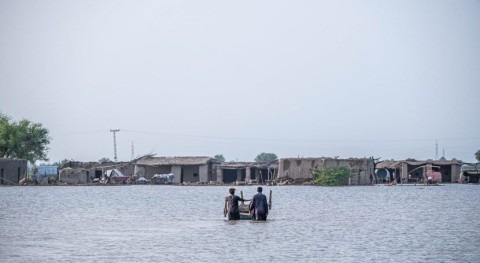Providing universal access to water supply, sanitation, and hygiene (WASH) could reduce Tanzania’s economic losses by $1.9 billion per year by 2030, and the country could potentially generate more than $2.4 billion each year in savings on excess medical costs and lost productivity due to inadequate access, according to a new World Bank report.
The just published 18th edition of the Tanzania Economic Update: Clean Water, Bright Future: The Transformative Impact of Investing in WASH shows that while the country has made significant progress in recent years in improving access to WASH services, only 61 percent of households have access to basic water supply, 32 percent to basic sanitation, and 48 percent to basic hygiene (per the Sustainable Development Goals’ definitions). More than nine percent of the population continues to practice open defecation which entails serious health risks. In addition, rural areas lag behind urban centers in all dimensions of WASH.
“For Tanzania to ensure universal WASH access, considerable upfront investment is required to avoid the devastating consequences of inadequate services,” said Nathan Belete, World Bank Country Director. “Achieving WASH goals can support the jobs agenda while mitigating the adverse effects on workforce productivity and advance Tanzania’s objectives for inclusive growth and poverty reduction.”
For Tanzania to ensure universal WASH access, considerable upfront investment is required to avoid the devastating consequences of inadequate services
Death and disease are the most immediate consequences of inadequate WASH services-- being responsible for 31,000 deaths (10 percent of preventable deaths) -- and cost the economy more than $2.4 billion each year in excess medical costs and lost productivity. The heaviest toll is being borne by women, children, and the poor and vulnerable. For example, WASH-related illnesses lessen the educational attainment of students and impair the cognitive development of children.
To achieve and sustain universal WASH access, the report recommends a combination of policy measures, institutional capacity building, and new financial arrangements at the national, subnational, and community levels. It calls for prioritizing the cross-cutting impact of WASH on the government’s larger policy agenda and urges policymakers across sectors to advocate for WASH investments and develop collaborative solutions to address their shared challenges.
“The implementation of Tanzania’s third Water Sector Development Program (WSDP) requires an estimated $6.5 billion in total,” said Ruth Kennedy-Walker, World Bank Senior Water Supply and Sanitation Specialist and report co-author. “On the other hand, providing near universal WASH access would cost the government just $16 per capita per year, which is less than half the $38 per capita that inadequate WASH services cost Tanzania each year. The WSDP-3 implementation therefore would generate benefits equal to its initial investment of $4.1 billion, for WASH related activities under the program, within five years.”
On the overall economy, the 18th Tanzania Economic Update shows that strong macro fundamentals allowed Tanzania to emerge from the COVID-19 pandemic in good shape, though economic recovery has been relatively modest due to strong headwinds created by the ongoing Russian invasion of Ukraine, tightening global financial conditions, and global economic slow-down. For 2022, GDP growth was 4.6 percent, marginally higher than 4.3 percent growth in 2021. The economic recovery in 2022 nevertheless remains broad based with most sectors rebounding to pre-COVID activity levels.
Headline inflation continued to edge up during 2022 as a result of rising international commodity prices and severe drought, reaching 4.2 percent in the first nine months of 2022 compared to 3.5 percent in the same period the previous year. This is concerning as food makes up about thirty percent of the consumer price basket.
The pandemic caused an increase in the poverty rate, from 26.2 percent in 2019 to 27 percent in 2021, with only a minor reduction in the overall poverty rate anticipated in 2022. The report noted that reversing this pandemic effect could prove challenging amidst considerable development and reform challenges that have been exacerbated by the pandemic shock and spillovers from the Russian invasion of Ukraine.
The report highlights that strengthening the country’s’ capacity to build resilience, supporting productivity-enhancing private sector-led inclusive growth, attracting new foreign and domestic investment, and expanding fiscal space while maintaining debt sustainability remain key priority reforms over the short- and medium-term.


















